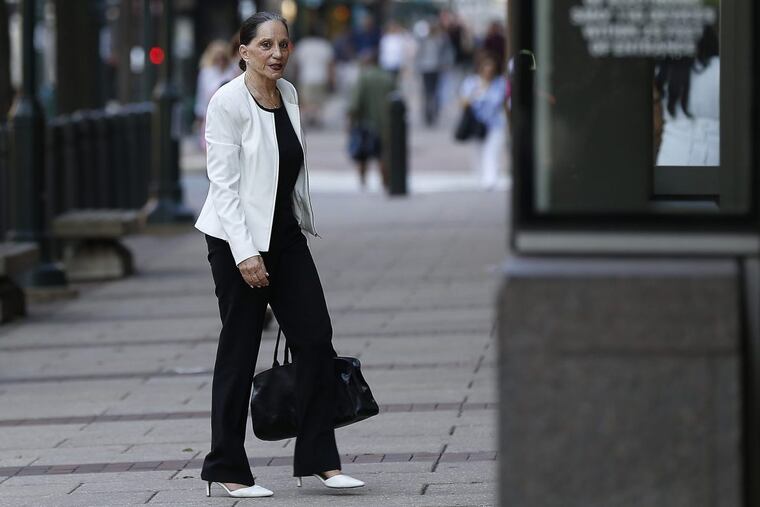Renee Tartaglione's federal fraud trial goes to the jury
The prosecutor urged the jury to find the 61-year-old Democratic politico guilty of all 53 counts charging her with conspiracy, theft, fraud, and tax evasion.

The question of whether Philadelphia politico Renee Tartaglione fleeced the Fairhill mental health clinic she led as president — and collected rent from as its landlord — is now in the hands of a federal court jury.
In her closing argument Thursday to a jury of six women and six men, Assistant U.S. Attorney Bea Witzleben urged them to find Tartaglione guilty on all 53 counts, charging her with conspiracy, theft, fraud, and tax evasion.
Witzleben said the evidence presented during 11 days of trial proved beyond a reasonable doubt that Tartaglione, 61, siphoned $1 million from the Juniata Community Mental Health Clinic between 2007 and 2012.
"This is all very uncomfortable," Witzleben told the jury. "The checks were to her, signed by her, and endorsed by her. This is more than uncomfortable."
Witzleben argued that Tartaglione, scion of a storied Philadelphia Democratic political family, tried to combine the tax advantages of directing a nonprofit with the personal gain of running a private for-profit company.
"When you're a nonprofit, you need to avoid self-dealing," Witzleben said. "You need to avoid even the appearance that they are shearing the sheep they're supposed to protect."
Witzleben said Tartaglione, as sole owner of Norris Hancock LLC, the company that owned the clinic's building at 2637 N. Fifth St., charged the clinic exorbitant rent, which the clinic agreed to pay through its often-absentee hand-picked board of directors.
The prosecutor cited one real estate expert who testified that the $75,000-a-month rent charged the Juniata clinic for 16,000 square feet spread over five of the six floors in the Fifth Street building was in poor, drug-plagued Fairhill. That was more than landlords charged for "A-class trophy buildings" in Center City, he said.
Defense attorney William A. DeStefano, however, told the jury that it was up to the tenant to decide if rent was too high, and that decision was highly subjective.
"It's no crime to raise the rent," DeStefano told the jury in his closing. "There's nothing wrong with telling the tenant that conditions changed and you're going to have to pay more rent."
DeStefano defended the clinic's board of directors, which Tartaglione led as president, saying it was not a hand-picked band of cronies.
"All the board members came from the community for one simple reason: It was their community. They lived there," DeStefano added, as did Tartaglione and husband Carlos Matos.
DeStefano spent much of his closing statement attacking the credibility of the two key government witnesses: Sandy Acosta, the clinic's administrator and co-founder, and her daughter, ex-State Rep. Leslie Acosta, a Democrat who represented the district in which the clinic was located and who worked there from 2007 to 2012 as a contract quality assurance analyst.
Both Acostas have pleaded guilty and testified as prosecution witnesses, describing a kickback scheme in which each received a supplemental check with their twice-a-month paycheck. They said they cashed the extra check but then gave Tartaglione the money so that she could avoid paying taxes on it.
DeStefano told the jury that the Acostas had simply forged the checks and stolen the money for themselves, saying there was no independent evidence corroborating the kickbacks to Tartaglione.
He called the Acostas' testimony ridiculous, saying it was "unworthy of your belief."
Tartaglione listened to the closings as she has the trial testimony: sitting back in her chair, composed, with no apparent reaction to what was being said. Matos, a Democratic ward leader with whom she founded the clinic in 2002, sat two rows back in the gallery.
Although the jury was supposed to have begun deliberations Thursday, the closing arguments and a rebuttal argument from Witzleben ran until 4:15 p.m. and Judge Joel H. Slomsky decided the jurors should start fresh on Friday morning.
DeStefano urged the jurors to recall the testimony by witnesses who described what Tartaglione and Matos invested in the Juniata clinic and its impact on the neighborhood. That impact went beyond providing mental health therapy to the poor; the clinic became a haven for the poor and a source of free food and clothing.
In her rebuttal, Witzleben too recalled that testimony, including the clinic's last business administrator, who wept when he described the clinic's 2016 closing: "It was tough. I feel that we let them down."
"I just want you to think for one minute," Witzleben said to the jury, "what that clinic could have done for the community if she didn't rob them blind."